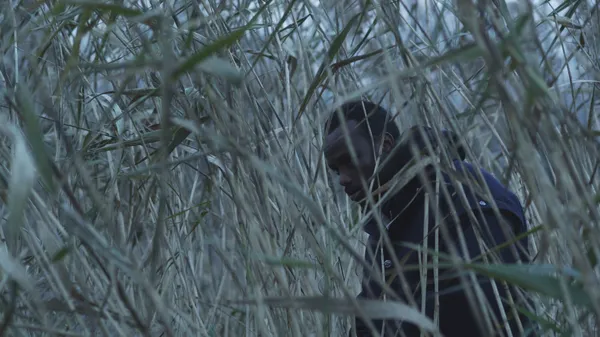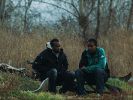Eye For Film >> Movies >> Abdul & Hamza (2015) Film Review
Abdul & Hamza
Reviewed by: Rebecca Naughten

Recently awarded a Special Mention in the First Film category at the FIDMarseille documentary film festival, Abdul & Hamza is a humane and timely docufiction about those who have to flee their own country in order to secure a better life for themselves and their families. The eponymous duo - who have met by chance and are strangers to each other to begin with, as indicated by the way that they're framed separately until they get to know one another - are Somalis who have recently arrived at the Serbian/Romanian border (Hamza says that it has taken a-year-and-a-half for him to get this far) with the intention to travel on to Belgrade.
Occupying what is either a holiday home or simply an abandoned property, the two men are resting up in a place of comparative safety on what is a perilous journey across borders where trust is in short supply. Through their conversations and interactions - chatting about their marital relationships and children, playing cards, and singing along to the radio - we gain a sense of their personalities and lives. But writer-director Marko Grba Singh also indicates that this is only a brief glimpse into an ongoing story - we do not learn how the men arrived at this location and it is clear that their journey is far from over.

The director draws parallels between Somalia and Serbia (both subject to civil wars and religious divisions) via one of the few conversations that the men have with any locals (who find points of shared experience with the temporary visitors) but also positions Abdul and Hamza as part of a cycle of history - a tour guide tells sightseers the legend of two guerillas (or two partisans, depending on the era) who supposedly resided in the tower of the fort of the small city of Vršac. The cinematography (by Marko Milovanovi? and Staša Bukumirovi?) emphasises the greens in the landscape and the cold blue light of the region, which carries over into the Hamza's green Adidas zip top and Abdul's thick sweater and coat, making the men part of the landscape in keeping with their invisible status.
At the same time, the filmmaking process is made apparent through the figures of a pair of sound recordists (one of whom is the director himself) recording the same woodlands where Abdul and Hamza are staying. Whether both sets of men are in the area concurrently is unclear - are the sound recordists seeking traces of the two mythical men of legend, their humbler present incarnations, or actually recording the ambient sound as part of the soundscape of the film we're watching? Their presence draws attention to the ephemeral nature of sound - perhaps also a metaphor for the transitory nature of the stories of those in transit (how many of these stories are missed or lost because of the invisibility of their subjects?) - as heard in the gales that buffet the house, and building to the use of Leonard Cohen's The Partisan during a key sequence. In another film, Cohen's lyrics might seem too 'on point' but here the song conveys an emotion and a sense of endurance that has been honestly earned by the film through the men onscreen.
The 2015 Berwick Film and Media Arts Festival screened Abdul & Hamza as part of their stated attempt to break with the hierarchies of film programming wherein midlength films get lost in the gaps between the dominance of features or special programmes of shorts. The film's length makes it unlikely to travel beyond the festival circuit in the UK, but it is well worth seeking out - it takes the time it needs to tell the story that the filmmaker wanted to impart, and it does so with warmth and humanity in relation to an issue where people are habitually reduced to cold statistics.
Reviewed on: 30 Sep 2015















